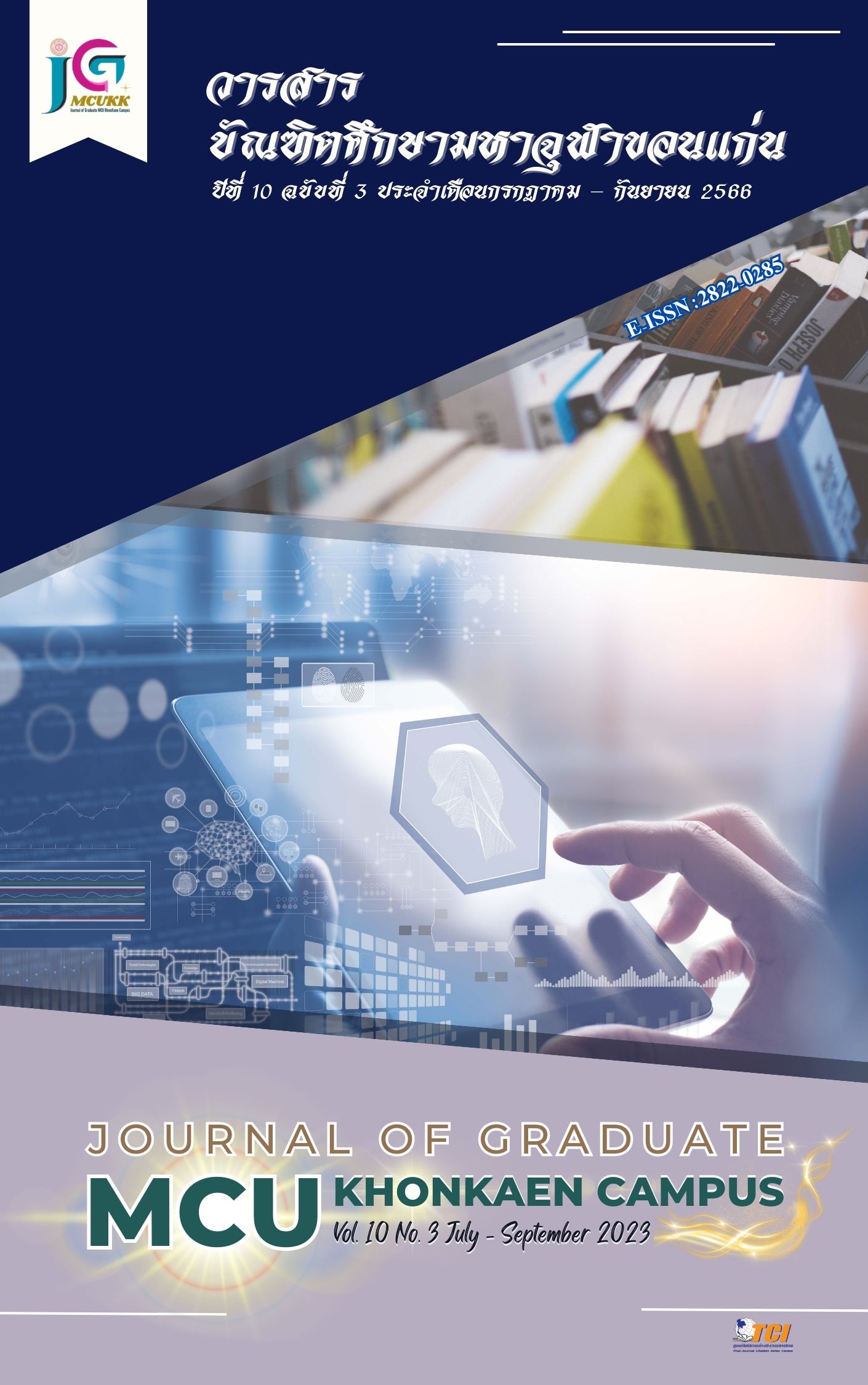People's Behavior in Choosing the Headman at Kasetsomboon District, Chaiyaphum Province
Main Article Content
Abstract
The objectives of this research are: 1. Study the behavioral level. Behavior comparison and suggestions for ways to develop people's behavior By applying the 4 Sanghawatthu principles in the election of village headmen in Kasetsomboon District Chaiyaphum Province. It is a mixed methods research. The sample group consisted of 397 citizens and 10 key informants or people. The tools used were questionnaires and interviews. Data were analyzed using a social science package. and analyze the content and context.
The research results were as follows:
1) The overall behavior of electing the village headman in Kaset Somboon District, Chaiyaphum Province in 3 aspects: (1) decision-making to elect community leaders;
(2) awareness of information propagation about community leader selection; (3) motives using the right to vote for community leaders was statistically rated at a high level. When considering each aspect, it was found that all items were rated at a high level, ranked in descending order as follows: in terms of decision-making to exercise the right to choose community leaders (the highest mean), followed by information and news perception, and motives for using the right to vote for community leaders respectively.
2) People with differences in age, level of education, and average monthly income had different behaviors in choosing the village headman in the district of Kaset Somboon District, Chaiyaphum Province with a statistical significance level of 0.05 overall. Most people are femaie, 223 people accounting for 56.2% aged between 51-50 year, 106 people accounting for 26.7% At the genders and occupations, primary level, there were 207 people, accounting for 52.1 % As for people of different of different genders and occupations had indifferent behaviors in choosing the village headman in the district of Kaset Somboon Chaiyaphum Province.
3) The level of behavior in selecting village headman of the people. In Kasetsomboon District Chaiyaphum Province it was found that behavior of exercising the right to choose village headmen in Kasetsomboon. District Chaiyaphum Province, all 3 aspects:
1. The decision to choose community leaders 2. Receive information.Propagation of the selection of community leader 3. The motivation for the right to vote for community leaders overall, it is at a high level ( = 3.40). When considering each aspect, it is found that it at a high level. Every item is arranged in descending order.it is found that the aspect Decided to use the right to choose community leaver has the highest averge (
= 4.12). followed by information (
= 3.98) and reasons for exercising the right to vote community (
= 3.90) respectively
4) There should be public relations or dissemination news to encourage people to vote for community leaders. In terms of the decision to choose a community leader, neutral selection should be encouraged. In terms of following up on election news, people should be encouraged to pay attention to community leaders' news from billboards and online media. In terms of motives for using the right to vote for community leaders, the public should be encouraged to participate in the selection meeting of the electoral committee. There should be a meeting to prepare for the implementation of the plan in terms of electoral activities. Regarding the promotion of participation in the behavior of the people in the election of the village headman according to Sagahavatthu principles, people should be encouraged to know and perform their
duties per the rules and regulations in the selection of community leaders.
Article Details

This work is licensed under a Creative Commons Attribution-NonCommercial-NoDerivatives 4.0 International License.
References
กรมการปกครอง กระทรวงมหาดไทย. (2564). วันกำนันผู้ใหญ่บ้าน. สืบค้นเมื่อ 10 กุมภาพันธ์ 2566, จาก https://kamnanphuyaibaan.com/
ประวิง คชาชีวะ และคณะ. (2549). รายงานการวิจัยปัญหาการจัดการเลือกตั้งนายกองค์การบริหารส่วนตำบล และสมาชิกสภาองค์การบริหารส่วนตำบล. กรุงเทพฯ: รอยัลเพลแอนส์แพ็ค.
รัฐ กันภัย. (2558). การรับรู้ข่าวสารและการมีส่วนร่วมของประชาชนที่ส่งผลต่อการพัฒนาท้องถิ่นในเขตองค์การบริหารส่วนตำบล จังหวัดภาคตะวันตกตอนล่าง. Veridian E-Journal, Silpakorn University ฉบับภาษาไทย สาขามนุษยศาสตร์ สังคมศาสตร์และศิลปะ, 8(1), 1075-1088.
สำนักบริหารการปกครองท้องที่. (2457). ประวัติสำนักบริหารการปกครองท้องที่ราชบัญญัติลักษณะปกครองท้องที่ พ.ศ. 2457. สืบค้นวันที่ 18 มีนาคม 2565, จาก https://multi.dopa.go.th/pab/info_organ/about1
สำนักบริหารการปกครองท้องที่. (2551). ระเบียบกระทรวงมหาดไทยว่าด้วยการเลือกผู้ใหญ่บ้าน (2551). สืบค้นวันที่ 18 มีนาคม 2565, จาก https://multi.dopa.go.th/pab/info_organ/about8/topic68
สุรพงษ์ รุ่งวารินทร์. (2561). บทบาทด้านการปกครองของกำนัน ผู้ใหญ่บ้าน กรณีจังหวัดสุพรรณบุรี. วารสารวิชาการมหาวิทยาลัย, 10(1), 281-288.
อมรภัค ทับทิมทวีโชค และ เดือนเพ็ญ ธีรวรรณวิวัฒน์. (2565). การเลือกผู้ใหญ่บ้านและความพึงพอใจที่มีต่อการปฏิบัติหน้าที่ของผู้ใหญ่บ้านในจังหวัดชัยนาท. วารสารรัฐประศาสนศาสตร์ Thai Journal of Public Administration, 20(2), 23-52.

